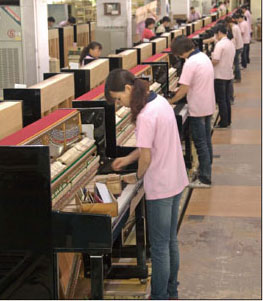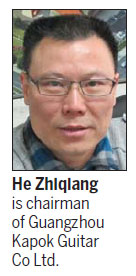Changing tunes
Updated: 2012-03-30 09:09
By Yang Yang and Chen Yingqun (China Daily)
|
||||||||
|
 Pearl River Piano's production line with constant temperature and humidity, which is key to ensure pitch accuracy of every piano. [Yang Yang / China Daily]
|
 |
Musical instrument makers look for a place under the sun with diverse strategies
For He Zhiqiang, chairman of Guangzhou Kapok Guitar Co Ltd, the biggest concern these days is to find new overseas markets for his company's flagship products, Kapok guitars. Kapok, the oldest and biggest guitar producer in China, is facing a major hurdle in exploring new markets in Europe and other nations - the inevitable cheap tag often associated with most Chinese products and exports.
But He says Kapok did make some waves at the recently concluded Musikmesse 2012, one of the world's biggest fairs for musical instruments, live music and the music business, in Frankfurt. "We hope the Frankfurt efforts will translate into fresh orders for the company," he says. Orders for Kapok-branded products the guitar maker received during the fair were 15 percent more than those in a year earlier event.
"We want to make our brand well-known in the music world," says He, at the Kapok facility in Guangzhou, South China's Guangdong province, a major manufacturing center for musical instruments.
Of the 23 Chinese companies that figured in the 2010 list of top 225 musical instrument makers in the world published by the American Music Trades magazine, eight are from Guangdong. That ranking and the rich legacy over the years have made Guangdong province, particularly Guangzhou, the main base for musical instrument exports and production in China.
But in a sign of the times, the music makers in Guangzhou are now harping on a different note, which they expect would set the future course for the industry. The old practice of original equipment manufacture (OEM) and unbranded mass production is slowly making way for branded and exceptional quality products that are made in China.
That changeover has not been an easy one, considering that Guangdong's strength has always been its OEM business. Most big international guitar brands have their OEM production in Guangzhou, including Gibson, Epiphone, Jay Terser, Parker, Oscar Schmidt and Washburn.
Last year, the 46 major musical instrument makers in Guangdong recorded an output value of 6.87 billion yuan ($1.09 billion, 818 million euros), or about 30 percent of the country's total in the sector, continuing its leading position, according to statistics from the China Musical Instrument Association (CMIA). Exports totaled 2.14 billion yuan, or more than 25 percent of the country's total.
"Guangdong has the pole position in China's musical instrument manufacturing in many major categories such as pianos, violins and guitars," says Li Aiqun, secretary-general of the Guangdong Musical Instrument Association.
"In Guangdong, Guangzhou is the most important manufacturing area in terms of output, exports, sales and techniques and skills. The city is home to more than 60 percent of the companies based in Guangdong," she says.
But much like the different genres of musical instruments they belong to, each category also has a different approach when it comes to the target markets.
Guitar producers are still looking to make more inroads in the middle- and low-end overseas markets, while the piano makers led by Pearl River Piano are aiming for a slice of the high-end market. On the other hand, violin makers are trying to build up their talent pool to come out with more upscale violins.

 Relief reaches isolated village
Relief reaches isolated village
 Rainfall poses new threats to quake-hit region
Rainfall poses new threats to quake-hit region
 Funerals begin for Boston bombing victims
Funerals begin for Boston bombing victims
 Quake takeaway from China's Air Force
Quake takeaway from China's Air Force
 Obama celebrates young inventors at science fair
Obama celebrates young inventors at science fair
 Earth Day marked around the world
Earth Day marked around the world
 Volunteer team helping students find sense of normalcy
Volunteer team helping students find sense of normalcy
 Ethnic groups quick to join rescue efforts
Ethnic groups quick to join rescue efforts
Most Viewed
Editor's Picks

|

|

|

|

|

|
Today's Top News
Chinese fleet drives out Japan's boats from Diaoyu
Health new priority for quake zone
Inspired by Guan, more Chinese pick up golf
Russia criticizes US reports on human rights
China, ROK criticize visits to shrine
Sino-US shared interests emphasized
China 'aims to share its dream with world'
Chinese president appoints 5 new ambassadors
US Weekly

|

|







